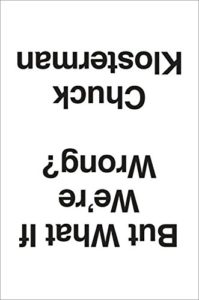 Chuck Klosterman’s But What If We’re Wrong? Thinking About the Present As If It Were the Past is a bit of a mind f*ck.
Chuck Klosterman’s But What If We’re Wrong? Thinking About the Present As If It Were the Past is a bit of a mind f*ck.
The book takes a look a music, culture and history through an inverted lens. Klosterman asks what about today’s society will seem important (and relevant) through the lens of history? In short, not that much. The things we talk about and obsess over will in 100 or 200 years fade from memory. In a NPR interview Klosterman said:
“Anybody who – the more you learn about culture, more you realize that it’s just sort of like a reflection of the people living at the time. But just because it’s not essential to our existence necessarily doesn’t mean it doesn’t have significance. It has significance to the people who care about it.”
Klosterman never really touches on the topic of finance and economics. But with some distance we can probably see that the heated debates of day over passive vs. active, factor investing and the equity risk premium will seem pretty trivial in the distant future. We care deeply about these issue but in the light of history they will fade. For all we know in a hundred years the idea of saving for “retirement” will seem quiet silly.
The point of the book and any kind of exercise is to invert your assumptions and look at the situation today with fresh eyes. Towards the end of the book Klosterman writes:
“There is not, in a material sense, any benefit to being right about a future you will not experience. But there are intrinsic benefits to constantly probing the possibility that our assumptions about the future might be wrong: humility and wonder. It’s good to view reality as beyond our understanding, because it is. And it’s exciting to imagine the prospect of a reality that cannot be imagined, because that’s as close to pansophical omniscience as we will ever come. If you aspire to be truly open-minded, you can’t just try to see the other side of an argument. That’s not enough. You have to go all the way.” – Chuck Klosterman, But What If We’re Wrong? pp. 252-253
Being open-minded isn’t easy for investors. We are beset by confirmation bias and even worse we are blind to our own biases. That is why inverting your thinking, Klosterman-style, can be liberating and enlightening. So your home work is to answer the following question:
What idea in finance today, that we hold to be true, will seem laughable in 100 years?
Chuck Klosterman has done a couple of podcasts about the book with Marc Maron on WTF and Russ Roberts on EconTalk. Both are worth checking out especially if you are interested in buying the book.








